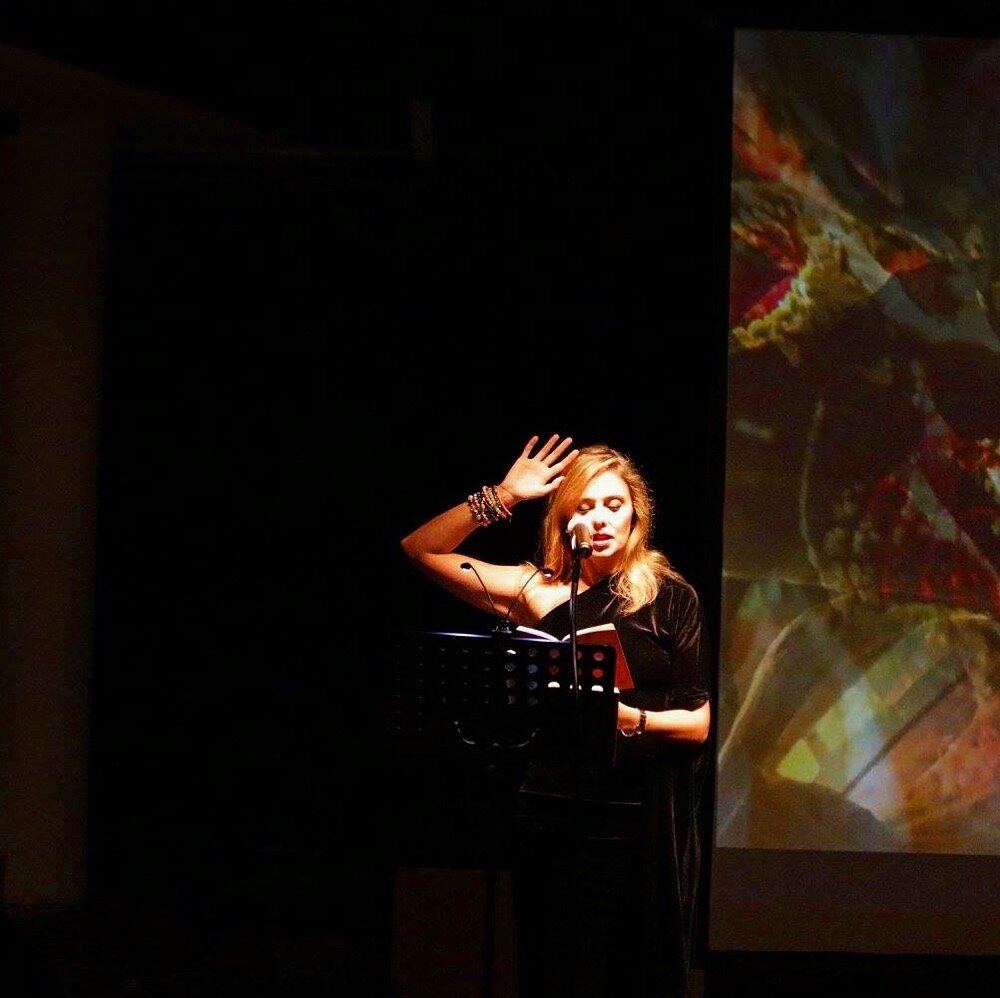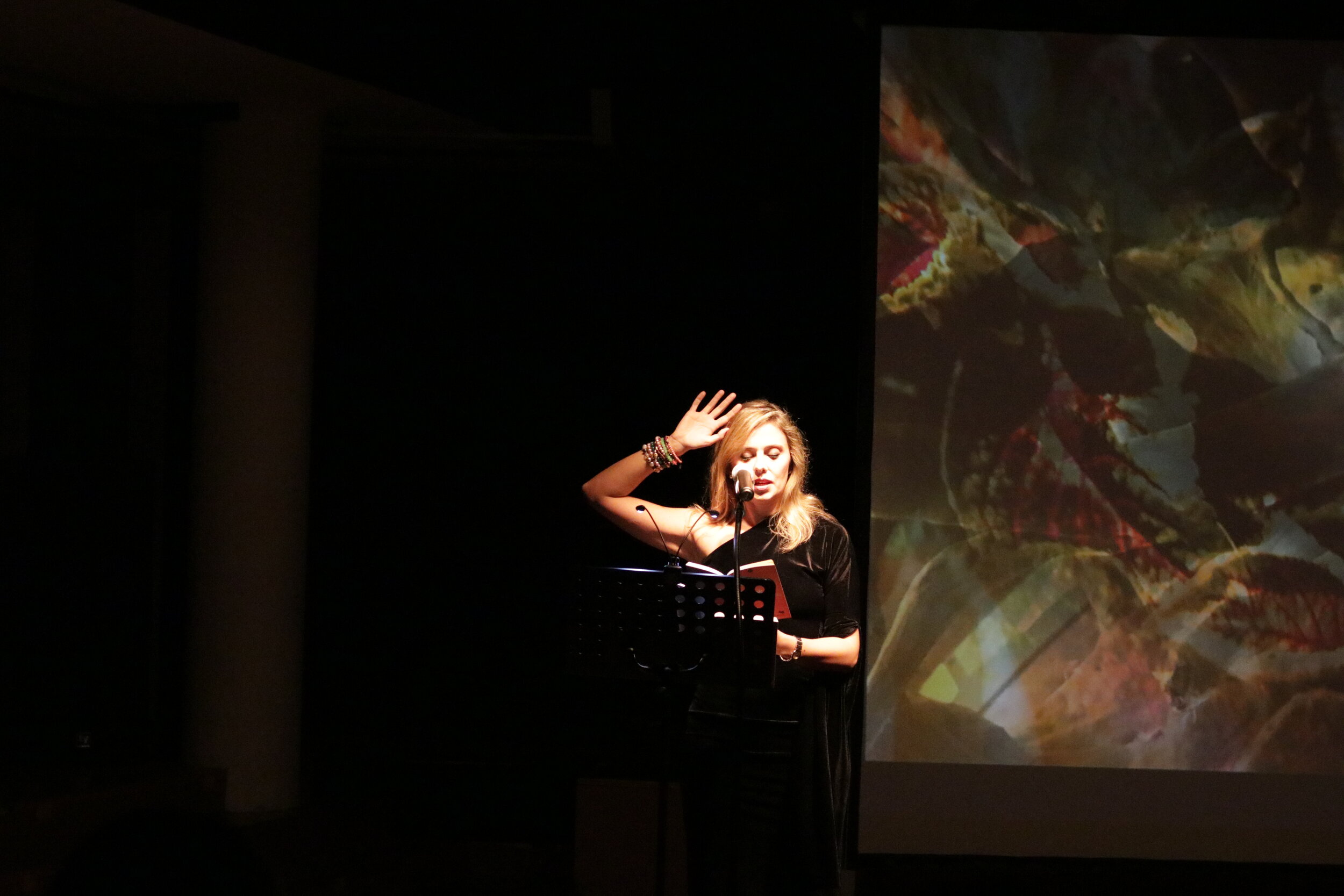An introduction to the poet Natasha Sardzoska (Nataša Sardžoska)
by Ren Powell
Sardzosкa has said "I never defined myself as a poet because a poet consists only in the very action of writing." When I ask her to explain what she means by this she describes a person’s metamorphosis into a poet as something that happens during the act of writing. In the same way a runner only exists as a runner when her legs are moving, the poet only exists because a kind of extra limb is in movement – a limb that needs to be exercised.
This summer I was invited to the Struga International Poetry Festival in Macedonia. Not all the poets who participate attended all the readings, but I did, and because of that I was privileged to hear Sardzoska read on several occasions. And each time I was fascinated.
Natasha Sardzoska is a North Macedonian poet, essayist, writer and literary translator. She is also a research anthropologist. She has worked as an interpreter for French, Italian, Spanish, Portuguese, Croatian and Catalan. She read her poetry in her native tongue of Macedonian.
I don’t understand a word of Macedonian. And we have all heard the quote attributed to Robert Frost: “Poetry is what is lost in translation”. And having worked as a translator for nearly 30 years now, I tend to agree. As translators, some of us begin with a literal translation: a trot, or crib. Next, we try to find the truth of the text, the colors in the metaphors, the tone of voice. Then we try to shape it into the music of the target language.
The thing is, Sardzoska poems aren’t music as much as they are muscle.
"In the process of poetry-making,
I am cutting off the reality to produce
another sensational reality.” [emphasis mine]
By the time I got back from the festival her book Skin (Inner Child Press International, 2019) had arrived. The book begins with a disclaimer by the editor, who explains why the press chooses not to impose a normative English grammar on translations. They concede the result can sometimes sound awkward but believe that the authenticity of the poetry might remain. It is an interesting approach. And in the case of Sardzoska’s poetry, I don’t think there would have been a better one.
It was only while reading her book I learned that Sardzoksa often performs her poems in collaboration with musicians. I asked her about this aspect of her work:
Ren:
When I heard you read in Struga, I was very much drawn to your poetry and your performances. You gave a conventional reading in the context of the festival, but I sensed the theatrical elements in your work and wasn’t surprised to learn that you do more performance-oriented poetry projects. When you collaborate with musicians do you write with the somatic performance in mind first? Or do you write stand-alone literature, and then blend the music and "stage" the poems?
Natasha:
Yes, at the Struga Poetry Festival I was "imposed" some pattern of reading and I felt conditioned by the light, the room, the audience etc. It is what it is. It is just another structure. However, I do like to explore connections between poetry, music and dance and create a powerful theater of motion, sound and metaphor. La Fura dels Baus!!! See what I mean?
Corporality is very present in my poetry. I try to reduce the body to a space which is deprived of meaning and analyze it with the instruments of poetry. I even have a poem called "Bodily Ether" where I combine laws of physics and the rhythm of poetry.
Even when I perform my poems, I combine them with dance. I like to express with my nerves and muscles what I write and convey the meaning to the audience. Or rather: the feeling, which is like a melting fire, a liquid fire.
[Jorge Luis] Borges once wrote:Tango is as old as the mankind: it was born with the first pain of the soul. Tango is (...) an ambiguous conversation without words, vertical expression of a horizontal desire.
This is precisely how I perceive the nexus where dance and poetry meet: an ambiguous conversation, a vertical expression of a horizontal desire. And it is not a question of merits, but rather a question of a “fatality that needs to be sustained” as the Argentine writer Julio Cortazar says.
Poetry was born with the first pain of the soul - just like dance - [It arose] from the impossibility to release the pain outside the body, to give a voice to that pain, from the unsustainability of that pain: it is a desire of exit, of exile, of transfer, of translation. This is why I dance when I recite my poems. It is an inner fire that needs to talk.In my latest book Coxis I tried to give voice to the pain throughout the organs of the body. I divided the book in two parts: sacrum and plexus. I was convinced that only through poetry can our organs express their pain. I wanted to give voice to the pain. I wanted to explore which voice will arise from the "resurrection of presences" (Octavio Paz), and what "plant" could grow from my open wound in which I have put "a semen" (Bei Dao).
Allusions can communicate on the surface of the skin, in the ether, in my melody, in the rhythm, or differently, I investigate how, I cannot tell, but for sure far away from the conventional language imprisoned in the chains of grammar and linear meanings. We talk with our skin, after all.
Ren:
In the introduction of Skin you write "... capturing the extreme dramaturgy inside the chamber space of the human existence." I love this description. It makes me think of chamber plays and the intimacy of that kind of theater. Your poems - even your prose introduction to the book - are saturated with sensual imagery. You describe meaning as "shifting and slippery yet assertive".
Natasha:
Meaning is assertive because it leaves you without a choice. It makes you feel trapped and powerless - but yet - even then - still powerful even though you know that everything that I try to write seems like it refuses to be understood or to understand you. It is hard to explain. But in one my books entitled He Pulled with an Invisible String I strongly wanted to represent the chamber theatrical space of my existence where I was the "doll on strings" - pulled by the author and by the Man, the Male, the Lover, the dialogue with Him who is pulling the strings back and forth. It is fatal. It is even beyond sensual imagery.
At some point it really becomes a chamber play but saturated with unbearable condition of loving and living. Saturated with the absurd of the communication. This is why I often refer to the metaphor of muteness, mute as a state of refusal to talk in order not to lie.
You recall "Persona" by Bergman? "I refuse to talk because I do not want to lie", It’s harsh and painful to be faithful to yourself to that extent. It is worthy though. The doors of the perception are wide open!
Ren:
Yes, you also say that in poetry " language can be... mute or even aphasic." Can you say more about that?
Natasha:
It is the reality of analogy and sensation that communicate between each other - and bring up unprecedented, pure, hermetic, paradigmatic experiences.
Imagine: you remove the organs from the human body and leave them to find the path back to one another. To reconnect. To find themselves again. To become again one organism. I have to cut off the tangible reality to create a new language and a new meaning which can only function through associations - as in a dream - and through a nexus which is only containing, or is interested, in the pure, transcendental field of "pure poetry". I think of the Italian hermetism.
So, I think those sensations can communicate among them despite the reality, sometimes even my reality, in which they were shaped and produced, but which have gone through another path where all meaning is shifting, slippery, metonymic and where a detail can become a whole and vice versa.
It is the reality of photography’s Sabattier Effect. Or the blow-up technique.
Ren:
What about the body in your writing process: Do you speak aloud when you write?
Natasha:
I speak aloud only when I know the poem I wrote is accomplished. It happens rarely. But I do it when I know I have reached the definite line. The red line beyond which nothing can be improved. Yet, where everything seems perfect and unconditional. This is when I read aloud.
Ren:
Can you say a little about your "coming of age" as a writer? How your poetry evolved? How it is married to your own body in performances? And your experiences with interactions with audiences when performing?
Natasha:
I was a little girl; I was 14 or something. My father was quite severe and rigid, traditional old-school conservative Macedonian man. I was not allowed to go out until I was 18. Every summer, his sister, my aunt, who worked in the Intellectual property agency, was talking me with her at the Struga poetry festival. These are the two preconditions which brought me to the white page and the pen - the pencil much more often than the pen - because the good poet is the one who erases a lot, not the one who writes a lot.
At the festival I was observing all those poets and who, to me, seemed quite magic. It sounds like a cliché. But they were to me the window to the world, the taste of another reality. Living in socialism was not the best path to cosmopolitanism!!!
Then, in my room, in the house my father built - my room was a rooftop mansard - I used to read and read and read and I was becoming enchanted. Then I used to write and write and write and it became an obsession. And I am still hooked on it.However, today, recently, my expression has evolved. My cousin, the piano player Ema Popivoda, the director of the Modoars contemporary music festival, invited me to perform with her on piano. I had a recital with her musical improvisation, and I decided to invite the audience and ask them to write on my skin what does the word SKIN means to them. It is funny: many of them, and even a child, wrote, "love, friendship, embrace".
At Genova poetry festival "Words Wide Open" I even had a body drawing performance: I was reciting my poems and the Italian artist Cosimo Frezzolini was drawing on my back, while French singer Charlene Puyiguiraud was singing a cappella. The Italian poet Anselmo Roveda, who was in the audience, told me he felt as if in a Twin Peaks episode. I felt goosebumps!
*If it is true that poetry is what is lost in translation, maybe we need to get under it. To forget the grammar and listen with our bodies. I have always been a big believer in the truth of onomatopoeia.
From “Mute Love”, Skin.
I gather inside me scraps, lost suitcases, crumbs of bread,
layers of flesh which have lost their flow,
bewildered in the cold desert.
Ordeals of ferocious beats,
tongues of mute fires…





